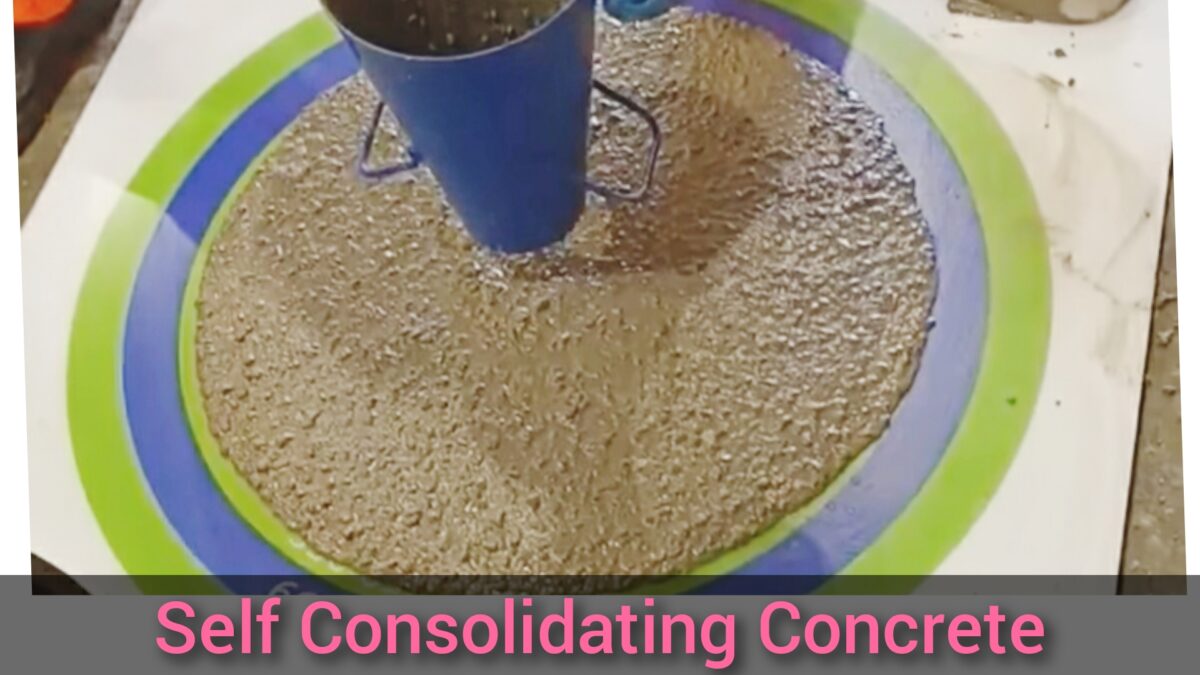Table of Contents
Introduction
Self Consolidating Concrete (SCC) is perceived as probably the best development in the concrete industry. Utilizing new admixtures and some mix changes, we can now create concrete that flows easily without segregating.

Mixed concrete that segregates loses strength and creates honeycombed areas next to the formwork. Self-consolidating nature makes it very valuable because there is no need for compaction.
This type of concrete can flow easily in all directions and make a good bond with reinforcement bars without any air voids. Traditional concrete required more compaction in those applications to work out all the entrapped air bubbles next to the forms and reinforce and get the concrete to move in.
What Is Self Consolidating Concrete?
Self Consolidating Concrete is also known as self-compacting concrete. Self-compacting concrete flows very fast around the formwork, and it does not segregate.
The slump value of Self Consolidating Concrete is normally 455 to 810 mm based on the requirement of the project. It does not need any mechanical device or vibrator to fill the voids because it is consolidated by itself.
Are you thinking that Self Consolidating Concrete uses a high proportion of water? Well, that’s not the case, eventually, it contains less water compared to conventional concrete.
Technical Aspect Of SCC
Self-consolidating concrete, also known as self-compacting concrete (SCC), is a special type of concrete mix that has unique physical properties. It has a low yield stress, high deformability, good segregation resistance, and moderate viscosity, which ensures that the solid particles remain suspended during transportation, placement, and curing without external compaction.
SCC is characterized by its flowability and passing ability, allowing it to flow easily within and around formwork, through obstructions and around corners, and follow the shape and surface texture of the mold closely once set. It does not require vibration or tamping after pouring, making it less labor-intensive than standard concrete mixes. SCC gains its fluid properties from an unusually high proportion of fine aggregate, such as sand, combined with superplasticizers and viscosity-enhancing admixtures.
Unlike standard concrete, SCC does not require vibration or compaction to remove air bubbles, cavitation, or honeycomb-like holes, making it more time-efficient and less labor-intensive. SCC was first conceptualized in 1986 by Prof. Okamura at Kochi University, Japan, at a time when skilled labor was scarce in the concrete industry.
The first generation of SCC used relatively high content of binder and high dosages of chemical admixtures, usually superplasticizer, to enhance flowability and stability. Such high-performance concrete was mostly used in repair applications and for casting concrete in restricted areas, and was specified for specialized applications.
SCC is suitable for casting heavily reinforced sections, complex shapes of formwork, and places where there can be no access to vibrators for compaction. However, the high cost of material used in SCC continues to hinder its widespread use in various segments of the construction industry, including commercial construction. Nonetheless, the incorporation of powder, such as supplementary cementitious materials and filler, can increase the deformability and cohesiveness of the paste, and reduce the water-cement ratio and high-range water reducer demand.
A total fine aggregate content of about 50% of total aggregate is appropriate in an SCC mix. SCC offers several advantages over traditional concrete, and its productivity economics can result in favorable performance benefits, making it a viable option for precast concrete production.
Properties Of Self Compacting Concrete
1. High Flowability:
Self consolidating concrete has a high flowability property, which means it can flow easily into intricate and tight spaces without the need for vibration or compaction.
2. High Workability:
Self consolidating concrete has a high workability property, which means it can be easily placed and finished with minimal effort.
3. High Strength:
Self consolidating concrete has high compressive strength, which makes it suitable for structural applications.
4. Excellent Durability:
Self consolidating concrete has excellent durability properties, including resistance to freeze-thaw cycles, chemical attacks, and abrasion.
5. Reduced Labor and Time:
The ability of self consolidating concrete to self-consolidate eliminates the need for vibration and compaction, which reduces the amount of labor required and speeds up construction time.
5. Improved Quality:
The self-compacting concrete ensure that the concrete fills all spaces and corners, resulting in a more uniform and consistent finish.
6. Reduced Noise Pollution:
The elimination of vibration and compaction reduces noise pollution on construction sites.
7. Better Aesthetics:
The high flowability of self consolidating concrete allows for more intricate and detailed molds, resulting in improved aesthetics and design possibilities.
Advantages Of Self Consolidating Concrete
- It reduces water in the concrete.
- More economical due to self consolidation.
- It is self-leveling concrete.
- Not much noise because of no mechanical device used for compaction.
- Provide a good working environment on the construction site.
- More strength compared to conventional concrete.
- Suitable to cast thin R.C.C slab.
Disadvantages Of Self Consolidating Concrete
- Due to the low water/cement ratio cracks may occur if curing not done properly.
- The manufacturing process is difficult and needs skilled workers.
- The casting process is slow.
Applications And Uses Of Self Consolidating Concrete
It produces precast concrete elements such as walls, columns, and beams, reduces labor costs, and ensures consistent quality.
Architectural concrete applications prefer SCC because it can flow into complex shapes and textures without the need for vibration.
Builders choose SCC for constructing bridge decks and tunnel linings because it ensures complete consolidation, high durability, and strength.
SCC is suitable for constructing high-rise buildings, marine structures, and industrial flooring where a smooth, level surface is essential.
It finds its use in repair and rehabilitation projects, retaining walls, and decorative concrete applications like stamped concrete.
SCC offers many benefits in construction projects and is a versatile material.
